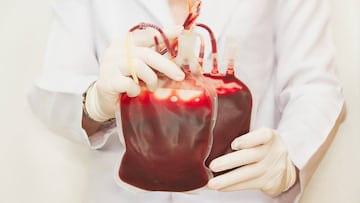What is ‘Golden Blood’, the incredibly rare blood type known as Rhnull
Known as Golden Blood, the blood type is found in only one in six million people around the world, making its donations rare and extremely valuable.


Up until the 20th century nobody knew why some people died after a blood transfusion while in others the receipt of blood from a donor caused no problems.
In 1901 Karl Landsteiner, an Austrian biologist, physician and immunologist, identified the blood types, A, B, and O, with the majority of them being incompatible, with just a few drops of blood from a non-compatible group leading to rejection of the transfer, illness and even death. He was awarded the Nobel Prize for Physiology or Medicine for his work in 1930. The blood types themselves are based on the presence or absence of different molecules on the surface of the red blood cells.
The four main blood groups are A, B, AB and O. In addition to these blood is also analysed as to whether it has Rh factor or not. The Rh factor is a protein found on the outside of red blood cells. If this protein is present the blood is Rh positive, if it’s absent, the blood is Rh negative.
If the protein is present, i.e. the blood is Rh+, and that blood is given to someone who is Rh-, the immune system of the recipient will identify the protein as dangerous and will create antibodies against it, attacking the transfused blood. The Rh protein is an antigen, being something that triggers an immune response.
People with Rh- blood can give to both Rh- and Rh+ recipients.
In total the four blood groups, with each being either Rh- or Rh+ give a total of eight main blood types, which can be transfused as follows.
Blood group compatibility
| Blood Type | Gives | Receives |
|---|---|---|
| A+ | A+, AB+ | A+, A-, O+, O- |
| O+ | O+, A+, B+, AB+ | O+, O- |
| B+ | B+, AB+ | B+, B-, O+, O- |
| AB+ | AB+ | Everyone |
| A- | A+, A-, AB+, AB- | A-, O- |
| O- | Everyone | O- |
| B- | B+, B-, AB+, AB- | B-, O- |
| AB- | AB+, AB- | AB-, A-, B-, O- |
What is Golden Blood?
In reality there are 49 different proteins in the Rh system, and whether someone is Rh- or Rh+ in fact only refers to one of these, RhD (which is the most significant for transfusion purposes).
In the 1960s a type of blood was discovered that was not only RhD- it had absolutely no Rh proteins whatsoever. This condition is known as Rhnull. A 2014 article in the magazine Mosaic looked at the case of a patient, known as Thomas, who had Rhnull blood, with the article titled: “The man with the golden blood”.
This lack of all Rh proteins can cause mild to moderate anaemia, with faster than normal destruction of red blood cells, leading to paleness and tiredness. The red blood cells themselves may be less elastic and the overall blood volume of the individual may be altered.
Blood transfusions for people with Golden Blood
People with Golden Blood can only receive transfusions from other people with the same condition, because otherwise the Rh antigens on the donated red blood cells would cause an immune reaction. Given how few people have Golden Blood, finding a donor is extremely difficult.
People with Golden Blood are encouraged to donate for themselves, with the blood being stored in case they should ever need it.
Golden Blood is also in high demand, because their blood is universally compatible with any rare blood type within the Rh system, meaning it has immense life-saving capability. Given how highly it is prized by doctors, it was called Golden Blood by Dr Thierry Peyrard, Director of the National Immunohematology Reference Laboratory in Paris.
Is the Golden Blood condition hereditary?
Related stories
Rhnull appears to be the result of a genetic mutation, and these mutations can be passed down through families. The risk of having Golden Blood is higher in families where there has been consanguineous marriage (marriage between cousins, brother-sister, or anybody who is a near or distant relative).
In the case of Thomas, the man cited in the Mosaic article, his Rhnull blood was due to two random mutations in his genes.
Complete your personal details to comment